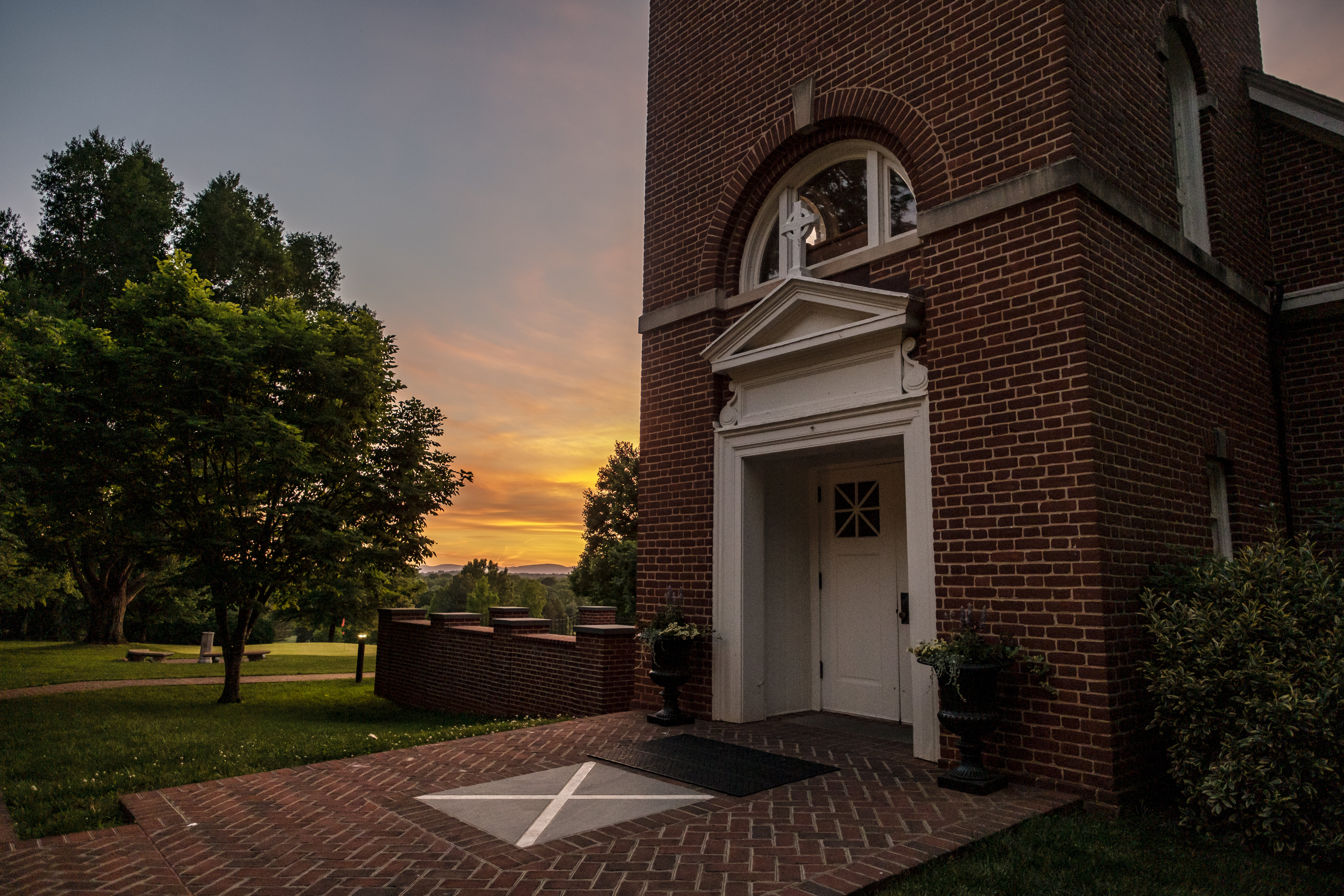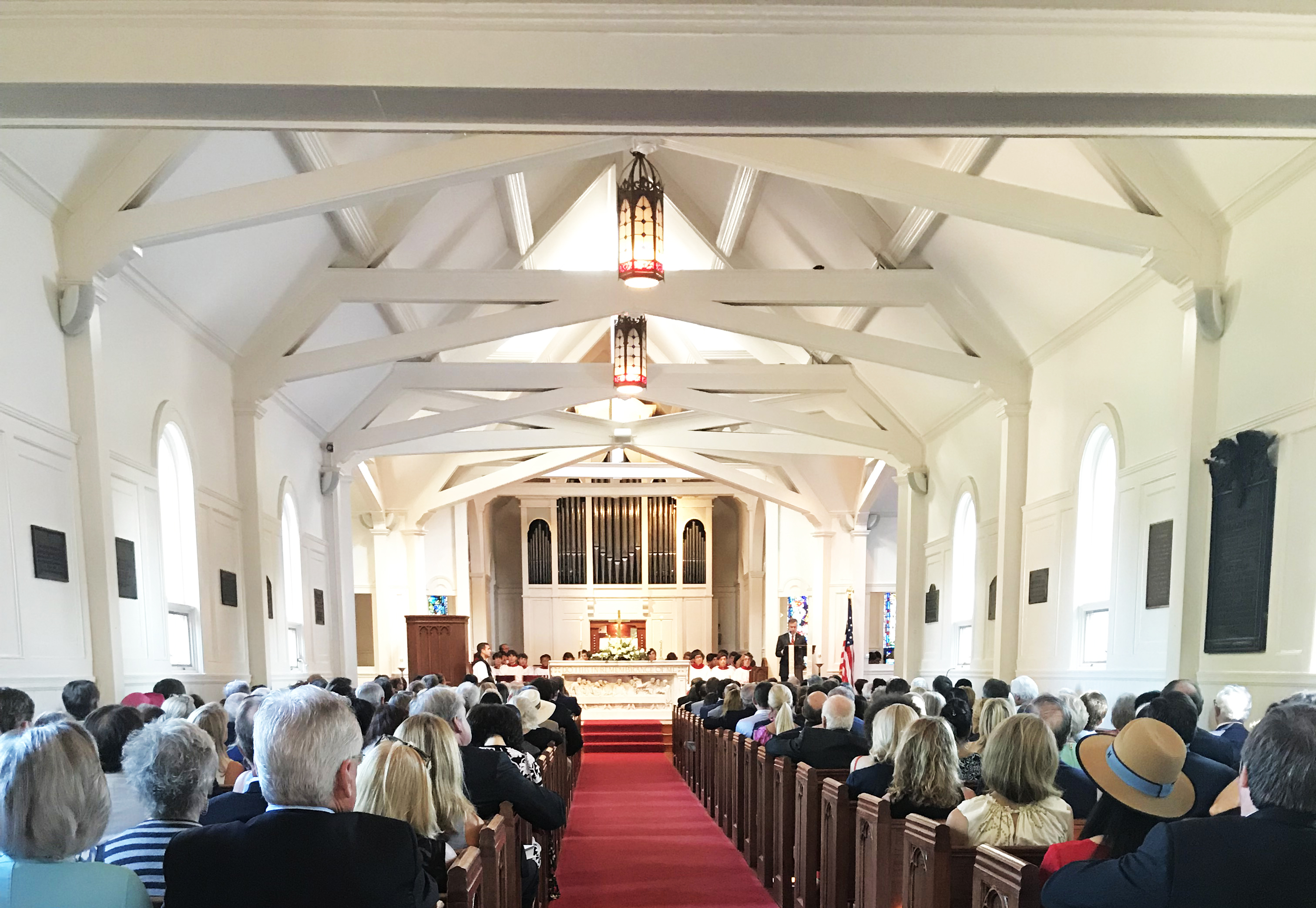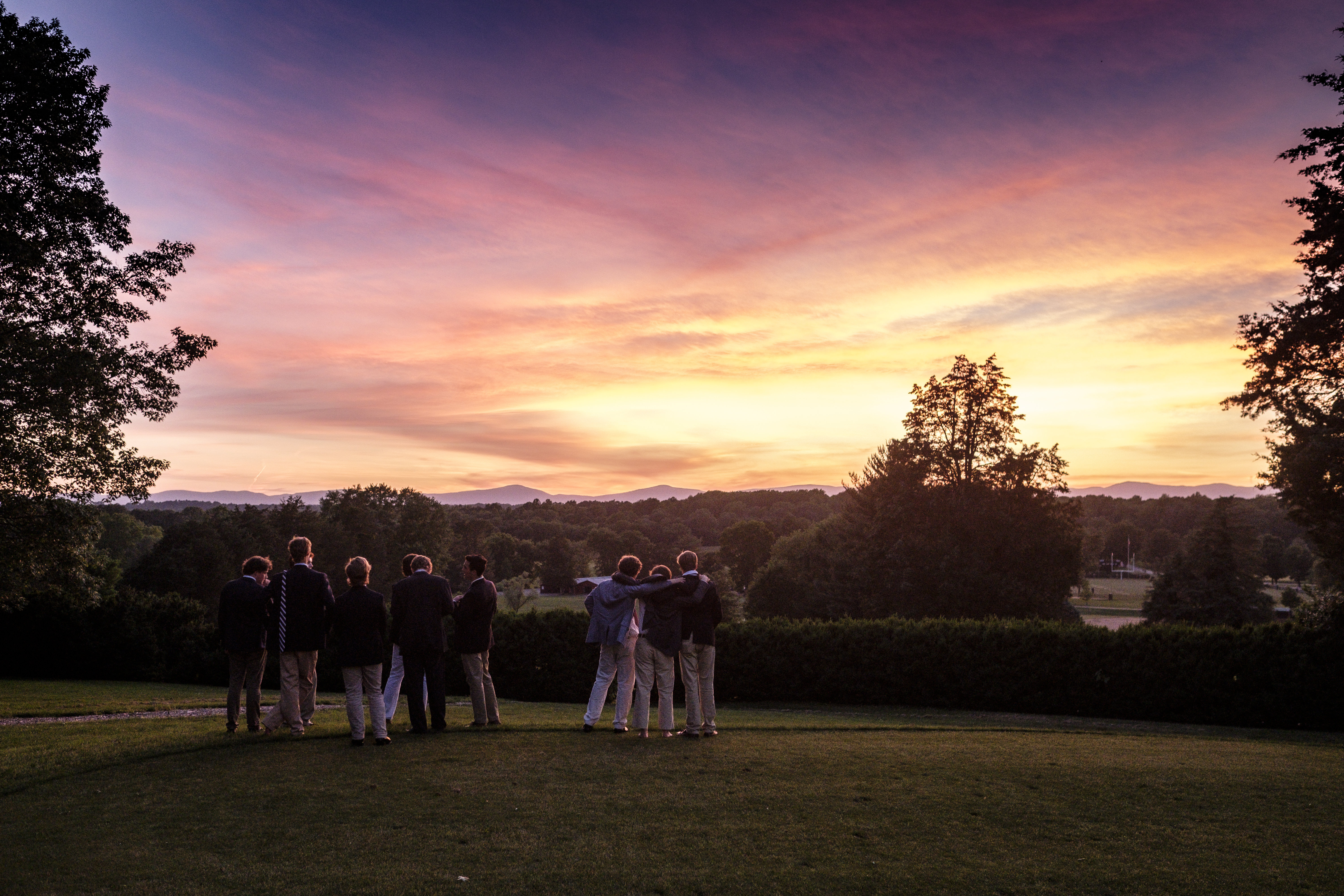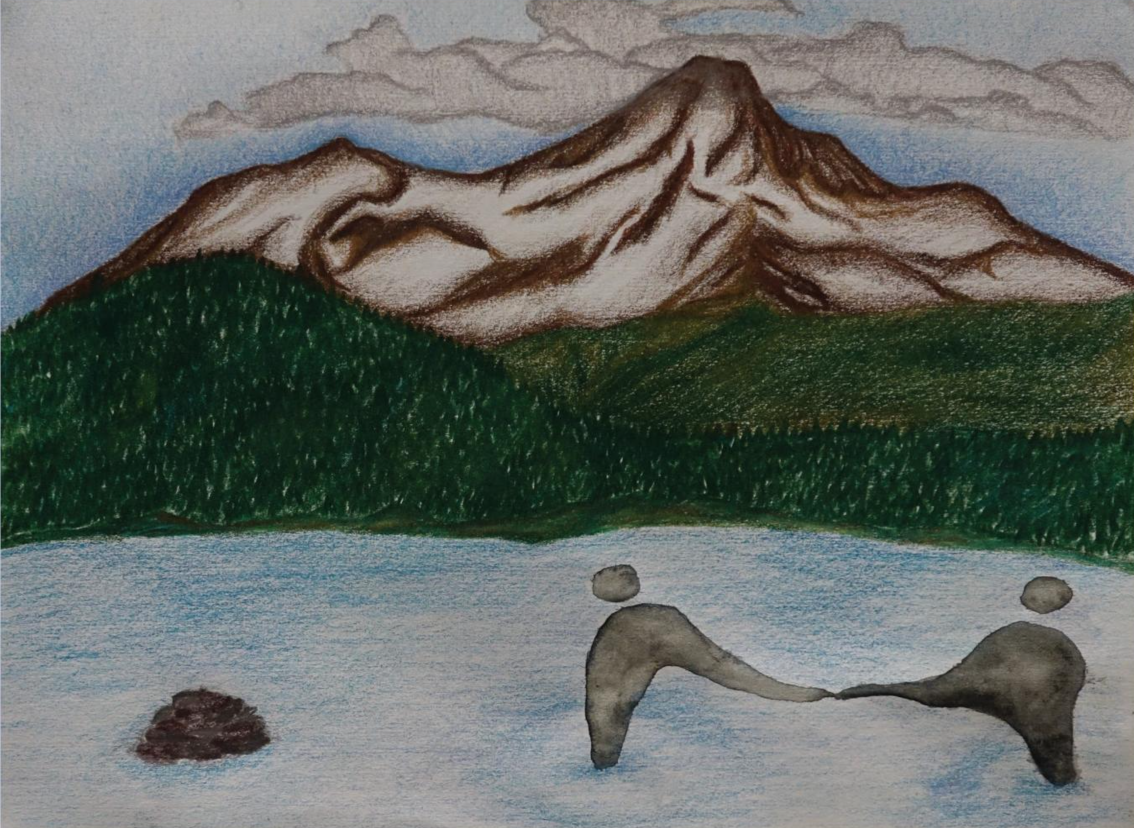
The following sermon was delivered by Headmaster Byron Hulsey ’86 on August 28, 2022 during the Opening of School service at St. Andrew’s Chapel.
Every year in the first week of August, the prefect board joins the dean of students office and me in Colorado to prepare for the journey that lies ahead. On our last evening together after a week of leadership training, and just before the board votes for their senior prefect, the boys agree on values to live by. At first the contributions this year were similar to what I’ve heard before: trust, consistency, respect, and empathy. But then a boy offered a value I’d never heard from a previous prefect board. “Family,” he said. I remember being taken aback, and I asked him what he meant. He said that when he thinks of Woodberry at its best, it’s faculty and students and staff and faculty families. “It’s everyone,” he insisted.
In my estimation, “family” is an elevating and inspirational expansion of “brotherhood,” an ideal that has inspired many generations of Woodberry boys. Emphasizing family and yoking the idea to our community at the start of the 134th year in the life of the school energizes me for the path ahead, and I’m eager for the opportunities to be connected as one Woodberry family throughout the year to come. Tonight’s readings from scripture offer compelling messages to each of us as we anticipate the twists and turns of the days and weeks to come.
The Woodberry family includes almost seven thousand alumni, and hundreds of former faculty and staff. And in our midst tonight are 125 new boys and twelve new members of our faculty. It’s a great honor and privilege to welcome you to the Tiger Nation and to the Woodberry family. I want you to come to know Woodberry as a second home. Earlier this week we on the faculty renewed our commitment that every boy in our care will be known, challenged, and loved. This renewed commitment is the best of who we are as teachers, coaches, and advisers. We are very excited that you are here, and we know from generations of experience that most of you want to be challenged most of the time, especially when you are known and cared for. That is how you feel respected and how we make clear to you that you matter. That will likely work for most of you, most of the time. But if you’re like the boys we’ve had in the past, some of you–for a wide variety of reasons–will resist being known, challenged, and loved.
Working hard to be accepted by the cool kids or fear of the unknown might hold you back. In the midst of likely anxiety and social uncertainty, I call on you to embrace with courage the adventure of allowing yourself to be known, to be truly known, to be challenged, really challenged, and to be loved. If you live bravely into this opportunity, you’ll get more from this experience that you would ever imagine. Day after day you’ll thrive in a web of life-giving relationships as you grow into habits like working hard, building your character, and taking care of each other. You’ll learn to appreciate that “quiet quitting” should never be cool at Woodberry. Ultimately, you’ll take important steps necessary on your own journey to grow from being a needy boy with your own particular preferences to a young man who can be counted on to take care of others, just as you are taken care of in your own times of need.
Tonight’s epistle to the Hebrews warns all of us in the Woodberry family to “not neglect to show hospitality to strangers.” May we all embrace this opportunity to “show hospitality to strangers” and live openly with each other and welcome each other back to Woodberry or to Woodberry for the first time. If a boy is sitting alone in the dining hall or alone in his room, join him and welcome him to the Woodberry community. If you’re a new boy, take heed of the epistle to the Hebrews and the reference to “remember your leaders.” Take time to listen and to learn, even as you lean into the opportunity to be your most authentic self in a community that wants you to excel. Identify the old boys you respect and want to emulate. Stay off the phone and take out your earbuds when you’re on the walkways up the hill. We want to get to know the new members of the Woodberry family, and we want you to get to know us.
Even as we celebrate family, we’d be wise to remember that not all families are healthy. Earlier this summer my son Ben and I watched The Godfather, and on Friday night, just before Claire and I dropped him off yesterday at Washington and Lee, we watched The Godfather II. These classic movies depict a toxic, crime-laden, and grotesque version of a family wreaking havoc on everyone in their way. At bottom, Michael Corleone’s criminal behavior is not about greed or fear, or power, or riches. It’s about entitlement. He believes he’s entitled to whatever he wants because he’s the Godfather, and entitlement fuels his reckless decision to kill his own brother and loses him his wife and children as well.
Competing perceptions of entitlement diminish healthy families and corrode human communities. And while we are more healthy than many of the communities in the world today, we struggle with our own competing perceptions of entitlement here at Woodberry. I understand that members of the faculty believe that some seniors historically act that way because we see them as entitled. I also understand that Woodberry boys believe that some teachers act that way because you see us as entitled. I’m very much aware that some members of our staff believe that some boys and some faculty act that way because we come off to them as entitled. There are members of the faculty who believe that some parents act that way because they’re entitled. There are people of color in our midst who believe that some of us act that way because we are entitled. And women in our community who believe that some boys and men act that way because we are entitled. As I reflect on my own leadership, I am certain that there have been occasions when boys or teachers or parents or members of the staff have believed that I misused my power as headmaster because I might come off to you as entitled. In all candor, not a single one of us is completely above reproach.
These competing conceptions of entitlement can threaten any human community and for sure corrode any healthy family, including ours here at Woodberry Forest. I hope and pray that this year we can remember that we are many individuals yoked together in a common cause and part of a vibrant and life-giving human community that is much bigger than we will ever be on our own. Being part of a family demands our best efforts, grants to us the comfort and care needed to navigate the tough times, and offers moments of utter joy and sheer exhilaration when we’ve climbed a mountain together.
For this work together we have vital Woodberry artifacts like the Boys Prayer that we will recite in just a moment and Amici, which we’ll sing shortly thereafter. But if we are to activate those artifacts into the generative practice of our daily lives, we’re called upon to renew our commitment to Christian humility as we know, challenge, and love the boys, and as everyone here works hard, builds our character, and takes care of each other.
Let’s challenge ourselves and each other to be humble and hungry always. Many of you have already embarked upon a mission shaped by humility. I’m grateful to Coach Matteo for presenting me with the new football shirt with “Sweep the Shed” emblazoned on the front. He made clear in his note to me that it was “earned, not given.” Some of you know that the phrase “sweep the shed” comes from a book about New Zealand’s legendary All Blacks rugby team. Former player Dan Carter writes, “no one in New Zealand likes a big head. In the All Black environment there’s no room for it, and if there’s ever signs of it happening, you’ll soon be brought down to earth…. From the start you learn humility. There are these structures in place, like the fact that we always leave the changing room as clean as when we walked in. So you’ll often see the likes of Richie McCaw and Coach Steve Hansen sweeping the shed.” How many of us will “sweep the shed” this year, on dorm, in the dining hall, or in our classrooms and offices?
And finally we’re fortified and energized for this work by Jesus’ example in the Gospel according to Luke. We learn from tonight’s reading that Jesus called on the most powerful “to take the lowest place…for all who exalt themselves will be humbled and those who humble themselves will be exalted.” He also urges “when you give a banquet, invite the poor, the crippled, and lame and the blind.” May we this year aspire to take care of each other, and may this year be a life-giving year in the rich and storied history of the Woodberry family. Amen.




